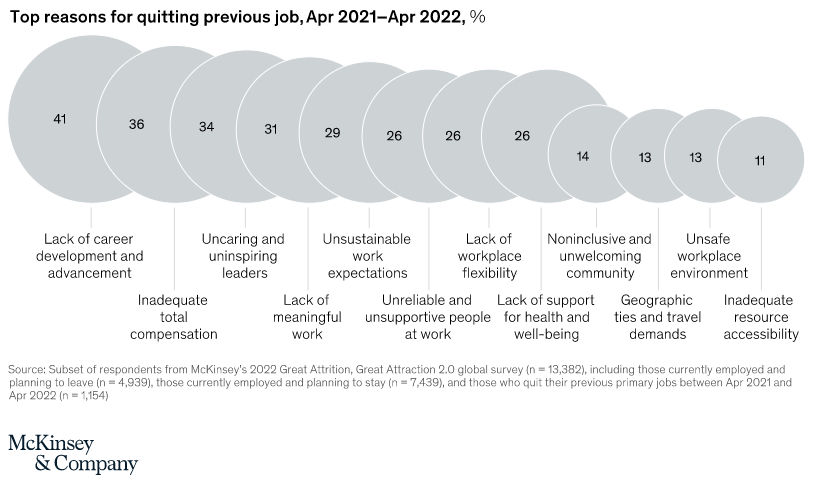New Data Shows a Shift in the Top Reason Workers are Quitting Their Jobs
August 2, 2022
For decades organizations have been concerned and focused on getting behind the primary reasons why workers voluntarily leave their jobs. And the impacts and effects of the Great Resignation, which has seen elevated levels of worker quits for over a year now, have made understanding quits data even more important.
For years most of the data around the reasons for quitting indicated that compensation (or lack of adequate compensation), was always cited as the top driver of resignations. No matter how the other elements of a total employer value proposition shifted in importance to employees over time, compensation was almost always the top reported reason for leaving a job, and presumably taking another, better compensated one. We’ve known for quite a long time that other elements of the employment experience matter to potential quitting employees – opportunity for development, commitment to the community, ability to work remotely, etc. all matter some – but none individually typically and traditionally mattered more than compensation has.
Well, this month McKinsey published a new report titled “The Great Attrition is making hiring harder. Are you searching the right talent pools?” which contained a fascinating chart on the reasons for employee resignations in the period April 2021 – April 2022, which indicated that the number one reason for resignations was not compensation, but rather “Lack of Career Development and Advancement” cited by 41% of respondents. “Inadequate Total Compensation’ was the next most widely cited reason for resignations, coming in at 36%. As I mentioned, this is pretty unusual in the review of many years of retention and resignation data.
The next most cited reasons workers gave for leaving a job were uninspiring or uncaring leaders, followed by lack of meaningful work, unsustainable work expectations, lack of support, and lack of flexibility. These are also fairly common and consistent reasons for employee resignations we have seen in historical data. But again, when compensation ceases to be the “top” reason for resignations, employers and HR leaders must take notice.
These findings are consistent with other recent research that indicates that employees—particularly the younger generation of workers —are looking for jobs that offer career advancement above many other popular elements, like flexible schedules or hybrid work arrangements.
The main conclusion for HR leaders, seeing compensation declining relatively as a reason for attrition – it’s that creating a culture that supports continuous growth and development is required for keeping people engaged and retained. Compensation will always be important, but if organizational leaders are not engaging and developing employees, compensation won’t be enough to keep people in a competitive job market. Very interesting findings and thanks to McKinsey for sharing this important data.
How we can help
Led by Trish Steed and Steve Boese, H3 HR Advisors harnesses over 40 years of experience to delivery HCM insights and guidance to global organizations.
H3 HR Advisory services
By leveraging technology, analytics, and our deep industry knowledge we can help you to reposition your workforce and ensure that you have the right people with the right capabilities in the right roles to positively impact the growth of your business.
HR Happy Hour Podcast Network
Created in 2009, The HR Happy Hour Show is hosted by Steve Boese and Trish Steed and is the longest continuously running internet radio show and podcast on Human Resources, HR Technology, Talent Practices, Workplace and Leadership topics.
H3 HR Speaking Services
We work closely with every client to customize your content - keynotes, webinars, research, infographics, and buyer’s guides - to inspire, educate and inform the audience enabling you to reset and realign your organization for a talent-led breakthrough.
Get in touch
Talk to us today and find out how we can help you and your organization leverage HCM technology to attract, onboard, retain and manage top talent.




